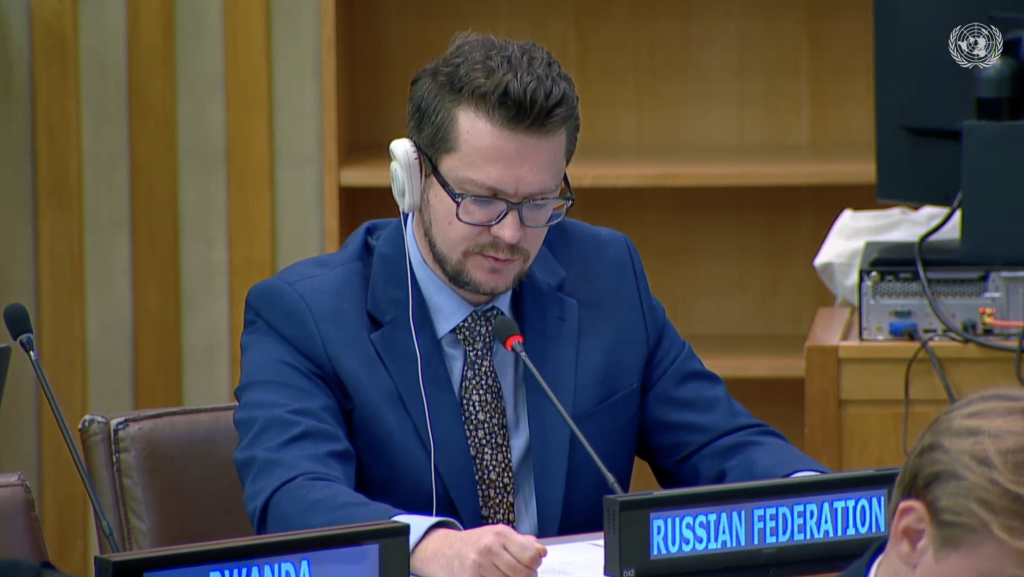Joint Statement on addressing and countering the world drug problem in the Third Committee of the 78th session of the UN General Assembly
Dear Ladies and Gentlemen,
Esteemed Chairman,
We would like to deliver the statement on addressing and countering world drug problem on behalf of the Group of 32 States (Algeria, the Arab Republic of Egypt, the Republic of Belarus, the People’s Republic of Bangladesh, Burkina Faso, the Republic of Cameroon, the People’s Republic of China, Cuba, the Democratic Republic of the Congo, the Democratic People’s Republic of Korea, Niger, India, the Islamic Republic of Iran, the Lao People’s Democratic Republic, the State of Palestine, Socialist Republic of Viet Nam, State of Qatar, Pakistan, the Russian Federation, Nicaragua, Kyrgyz Republic, the Republic of Kazakhstan, the Kingdom of Saudi Arabia, the Republic of Singapore, the Syrian Arab Republic, the Republic of Tajikistan, the United Arab Emirates, the Republic of Yemen, the Republic of Zimbabwe, the Republic of Mali, Iraq, the Republic of Indonesia).
We recognize that the world drug problem continues to pose a serious threat to global and regional security and stability, presents challenges to the health and well-being of humanity and undermines sustainable economic development of States.
We underscore that the Single Convention on Narcotic Drugs of 1961 as amended by the 1972 Protocol, the Convention on Psychotropic Substances of 1971 and the United Nations Convention against Illicit Traffic in Narcotic Drugs and Psychotropic Substances of 1988 constitute the cornerstone of the international drug control system and also urge State Parties to comply with their provisions and ensure their full and effective implementation.
We recognize that the world drug problem is complex and transnational in nature and reiterate the urgent need for strengthening international cooperation to address and counter the world drug problem that should be a collective effort pursued in a constructive and depoliticized manner with full respect for the sovereignty and territorial integrity of States as well as the principle of non-intervention in the internal affairs of States.
We reaffirm the main role of Member States in developing an effective and comprehensive approach to addressing and countering the world drug problem.
We are concerned about legalization of cannabis for non-medical purposes. We fully share the assessments of the International Narcotics Control Board, which clearly states, that the growing trend to allow the use of cannabis for nonmedical and non-scientific purposes constitutes a significant challenge for the international community, the State Parties and for the implementation of the three international drug control conventions. We would like to reiterate that the principle of pacta sunt servanda is applicable in the field of drug control treaties. We encourage Member States to raise awareness of harm from non-medical use of cannabis, and prioritize public health over private business through a comprehensive ban on advertising on cannabis products.
We reaffirm our shared commitment to effectively counter the world drug problem, which requires concerted and sustained action at the national and international levels, including fully complying with the three drug control conventions and accelerating the implementation of international drug policy commitments contained in the 2009 Political Declaration and Plan of Action on International Cooperation towards an Integrated and Balanced Strategy to Counter the World Drug Problem, the Joint Ministerial Statement of the 2014 high-level review by the Commission on Narcotic Drugs, and the outcome document of the special session of the General Assembly on the world drug problem held in 2016, as reaffirmed in the 2019 Ministerial Declaration, and make the best use of the high-level mid-term review in the Commission on Narcotic Drugs in 2024 to accelerate their implementation till 2029.
We further reaffirm our determination to counter the world drug problem and to actively promote a society free of drug abuse in order to help to ensure that all people can live in health, dignity and peace, with security and prosperity and recognize the need to enhance efforts to strengthen the prevention of drug abuse among children and youth, also in educational settings.
We reaffirm the principal role of the Commission on Narcotic Drugs as the policymaking body of the United Nations with prime responsibility for drug control matters, as well as the role of the United Nations Office on Drugs and Crime as the leading entity in the UN system for addressing and countering the world drug problem and further reaffirm the treaty-mandated role of the International Narcotics Control Board aimed at ensuring compliance of Parties with their obligations as specified under the three international drug control conventions and urge Member States to continue to actively cooperate with the International Narcotics Control Board in the exercise of its mandate to effectively monitor compliance by States parties with the three international drug control conventions.
We call for increasing the provision of technical assistance and capacity-building to Member States, upon request, in particular those most affected by the world drug problem, including by illicit cultivation and production, transit and consumption.
We reiterate our resolve to prevent and eliminate illicit cultivation, production, manufacturing and trafficking of narcotic drugs and psychotropic substances as well as the diversion of and illicit trafficking in precursors, money-laundering and illicit financial flows related to illicit drugs, as well as the illicit demand and abuse of drugs. We express concern regarding misuse of information and communication technologies for trafficking in narcotic drugs and precursor chemicals used in the manufacture of illicit drugs as well as online sale of illicit drugs, especially on the Internet, darknet, through messengers, anonymous and encrypted connections, virtual and electronic payment and call for strengthening bilateral, regional and international cooperation and promoting information-sharing for preventing and countering these threats.
Thank you.
